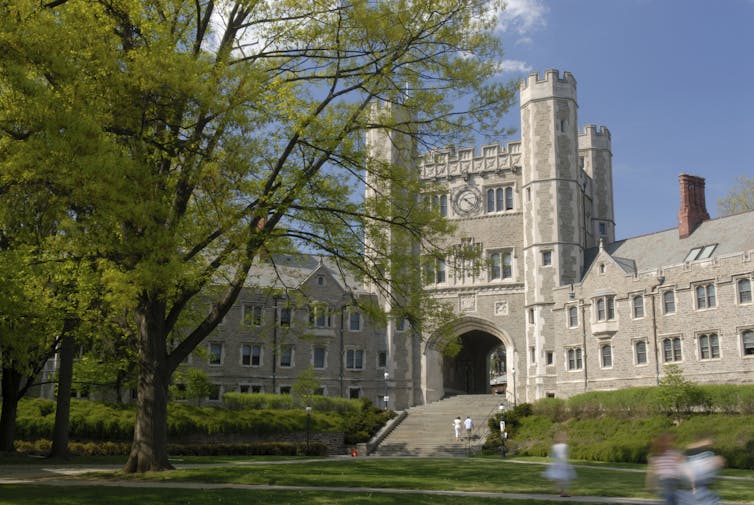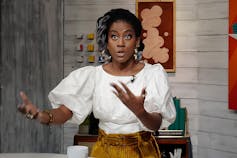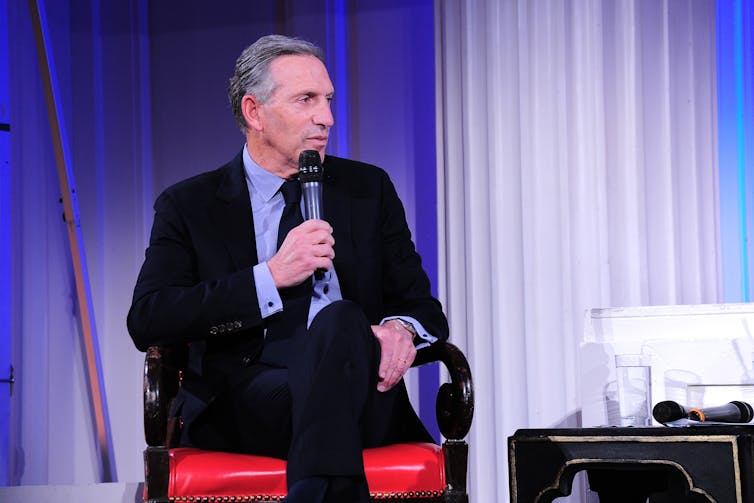Why graduates of elite universities dominate the Time 100 – and what it means for the rest of us
- Written by Jonathan Wai, Assistant Professor of Education Policy and Psychology and Endowed Chair, University of Arkansas
When Time magazine released its annual Time 100 list[1] of the most influential people around the world in September, The Cornell Daily Sun – an independent newspaper run by students at Cornell University – wasted no time in trumpeting the fact that three of the school’s alumni had made the list[2].
The three “Cornellians” were billionaire tech investor and philanthropist Robert F. Smith, Taiwan president Tsai Ing-wen and Anthony Fauci, the top infectious disease expert in the U.S., who has become a household name since the COVID-19 pandemic began.
Although it may be notable that three graduates from one of America’s top universities has made the Time 100, in some ways it is hardly surprising.
As researchers who specialize in higher education[3] and gifted students[4], we have analyzed[5] the educational backgrounds of the people who made the Time 100 since the list began in 1999[6] through 2019. We wanted to see if elite-school graduates were underrepresented or overrepresented among the Time 100. We also conducted a new analysis on the 2020 list[7] and present those findings for the first time here.
We found that although only about 2% to 5%[8] of all U.S. undergraduates went to elite universities, the alumni of those schools have been dominating the Time 100. Specifically, they have comprised anywhere from about 30% to 50% of the Time 100 from 1999 through 2020.
Questions of fairness
Looked at differently, the proportion of elite-university graduates on the Time 100 list has been anywhere from at least 6 to 10 times the proportion of such graduates throughout the nation.
Since their presence on the list is so disproportionate, our findings raise questions about whether the pathway to societal influence runs through elite schools more often than it does all others. Or is there just something special about the people who get into elite schools that makes them more likely to rise to prominent positions in society? And does it really matter[9] whether you attend an elite school or not?
 Princeton University graduates are well represented on the Time 100 list.
aimintang/E+ via Getty Images[10]
Princeton University graduates are well represented on the Time 100 list.
aimintang/E+ via Getty Images[10]
These questions are particularly important given concerns about elite universities being out of reach[11] for students who come from families that are not well off.
Definition of elite
To examine these issues, we had to come up with a definition of an elite school.
Though there are many ways one might categorize an institution as “elite” – such as ranking high on any one of numerous school rankings[12] – for this study we used a method[13] that took into account highly selective schools both within the U.S. and outside its borders.
We included some foreign schools because there are prominent people who make the Time 100 all across the globe, such as former Japanese Prime Minister Shinzo Abe[14] and the late Kofi Annan[15], a former U.N. Secretary-General.
Our definition captured the eight Ivy League schools[16], plus many of the top national universities and liberal arts colleges that consistently rank high in the U.S. News rankings[17] for both undergraduate and graduate education based on their average scores on college entrance exams, such as the SAT or ACT. Our definition also included many of the top international universities, such as Cambridge University, that consistently rank high in global rankings[18].
Individual backgrounds
Beyond whether Time 100 honorees went to elite schools or not, we thought it was worthwhile to look at their individual backgrounds. In doing so, we found that some people on the list grew up wealthy and went to an elite school, and some did not.
For instance, Hewlettt-Packard CEO Meg Whitman, who attended both Princeton and Harvard universities[19], is an example of someone from the Time 100 list who grew up well-to-do[20] and went to an elite school.
Conversely, some grew up well-to-do but did not attend elite schools, such as prior Time 100 member and House Speaker Nancy Pelosi, who attended Trinity College in Washington, D.C.[21]
Then there are some who grew up poor and made it into elite schools, such as American businessman and investor Larry Ellison[22], who attended but dropped out of the University of Chicago[23]; Supreme Court Associate Justice Sonia Sotomayor[24], who attended both Princeton and Yale universities[25]; and novelist Tomi Adeyemi[26], who went to Harvard[27].
 Tomi Adeyemi, a novelist featured on the Time 100 list, speaks about her novel ‘Children of Blood and Bone’ during BuzzFeed’s ‘AM To DM’ show on Dec. 3, 2019, in New York City.
Dominik Bindl/Getty Images[28]
Tomi Adeyemi, a novelist featured on the Time 100 list, speaks about her novel ‘Children of Blood and Bone’ during BuzzFeed’s ‘AM To DM’ show on Dec. 3, 2019, in New York City.
Dominik Bindl/Getty Images[28]
In addition, some Time 100 honorees grew up relatively poor and did not go to elite schools. They include billionaires Howard Schultz[29] – perhaps best known for his tenure as CEO of Starbucks – and Oprah Winfrey.
Schultz attended Northern Michigan University[30], and Winfrey went to Tennessee State University, although she did not earn her degree until after she started her career as a talk show host[31].
 Howard Schultz attends BCNY Annual Luncheon at 583 Park Avenue in New York City.
Owen Hoffmann/Patrick McMullan via Getty Images[32]
Howard Schultz attends BCNY Annual Luncheon at 583 Park Avenue in New York City.
Owen Hoffmann/Patrick McMullan via Getty Images[32]
Then there are some who grew up poor and didn’t go to college at all, such as the actor and director Tyler Perry[33].
Each of these people has a story about the path they took to achieve their accomplishments – stories that can help shine the light on what are the typical paths to success in modern society.
A new trend
In 2020, the percentage of Time 100 honorees who went to elite schools dropped to about 29%, the lowest percentage to date. In 2016 this percentage stood at 34%, and in 2018 it was 33%, which were earlier deviations from most other years. One commonality across the three years with the lowest percentage of elite school graduates – 2016, 2018 and 2020 – is that the “scientists/thinkers” category was not included in the respective lists by the editors, and that category typically has the highest percentage of graduates from elite schools.
Of course, it’s hard to know whether this relatively low percentage in 2020 is just a one-year deviation or a trend that will continue. One reason is that the selection of the list depends upon the current editors and unknown factors for that year.
It also depends on the gender of those who make the Time 100 list. For example, after 1999, the magazine’s editors have consistently selected larger and larger proportions of females for the list. In 1999 the male-to-female ratio was 5 to 1, but it has almost reached parity in recent years.
In 2019, women and men had similar proportions of elite school attendance. In 2020, for the first time, more women were selected for the Time 100 than men – we found that the male-to-female ratio was 0.8. However, the proportion of men on the 2020 list with elite school attendance – about 41% – was much higher than for women – about 19%.
It also pays to look at the category of accomplishment. Our 2019 analysis shows that higher proportions of scientists/thinkers – anywhere from about 60% to 80% – went to elite schools. The same is true for leaders/revolutionaries – about 40% to 70% went to elite schools. It also holds for builders/titans – about 30% to 70% went to elite schools.
[Deep knowledge, daily. Sign up for The Conversation’s newsletter[34].]
On the other hand, fewer heroes/icons – about 1% to 40% – and artists/entertainers – from 0% to 30% – went to elite schools. This pattern also held for the Time 100 list in 2020.
All these factors raise the question of why the proportion of people in the Time 100 attending elite schools has remained relatively high across time. Given that researchers have shown that students with lower-income backgrounds are much less likely to attend highly selective schools[35] – and also that low-income, high-achieving students are less likely to apply to top schools[36] – the Time 100 list raises the issue of not only whether America’s top colleges are accessible enough to the poor, but whether or not these disadvantaged but talented kids[37] are being given sufficient opportunity to shape the society in which they live.
References
- ^ Time 100 list (time.com)
- ^ three of the school’s alumni had made the list (cornellsun.com)
- ^ higher education (scholar.google.com)
- ^ gifted students (scholar.google.com)
- ^ we have analyzed (www.journalofexpertise.org)
- ^ began in 1999 (content.time.com)
- ^ 2020 list (time.com)
- ^ only about 2% to 5% (theconversation.com)
- ^ does it really matter (www.theatlantic.com)
- ^ aimintang/E+ via Getty Images (www.gettyimages.com)
- ^ concerns about elite universities being out of reach (www.hup.harvard.edu)
- ^ ranking high on any one of numerous school rankings (theconversation.com)
- ^ method (www.journalofexpertise.org)
- ^ Shinzo Abe (apnews.com)
- ^ Kofi Annan (www.un.org)
- ^ eight Ivy League schools (www.shemmassianconsulting.com)
- ^ U.S. News rankings (www.usnews.com)
- ^ global rankings (www.topuniversities.com)
- ^ attended both Princeton and Harvard universities (www.businessinsider.com)
- ^ well-to-do (www.businessinsider.com)
- ^ attended Trinity College in Washington, D.C. (www.britannica.com)
- ^ Larry Ellison (www.businessinsider.com)
- ^ attended but dropped out of the University of Chicago (www.forbes.com)
- ^ Supreme Court Associate Justice Sonia Sotomayor (www.today.com)
- ^ attended both Princeton and Yale universities (www.biography.com)
- ^ novelist Tomi Adeyemi (www.smh.com.au)
- ^ went to Harvard (www.tomiadeyemi.com)
- ^ Dominik Bindl/Getty Images (www.gettyimages.com)
- ^ Howard Schultz (www.howardschultz.com)
- ^ attended Northern Michigan University (www.biography.com)
- ^ after she started her career as a talk show host (www.washingtonpost.com)
- ^ Owen Hoffmann/Patrick McMullan via Getty Images (www.gettyimages.com)
- ^ Tyler Perry (www.forbes.com)
- ^ Sign up for The Conversation’s newsletter (theconversation.com)
- ^ likely to attend highly selective schools (doi.org)
- ^ less likely to apply to top schools (doi.org)
- ^ disadvantaged but talented kids (theconversation.com)
Authors: Jonathan Wai, Assistant Professor of Education Policy and Psychology and Endowed Chair, University of Arkansas

